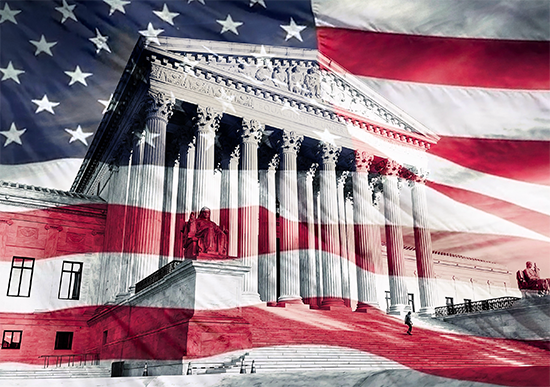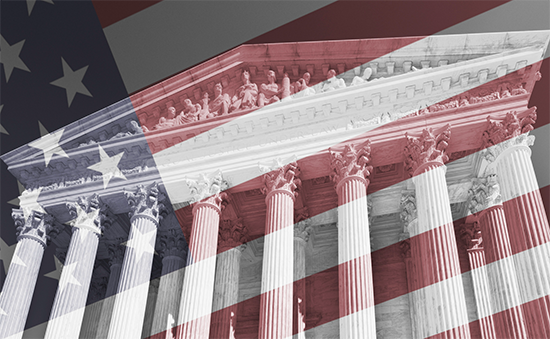
August-
September 2022
Give Me That Mountain!
------------------
|





Responding to Dobbs
By Matthew Steven Bracey
In early May 2022, Politico published a leaked draft of the Supreme Court’s majority opinion for Dobbs v. Jackson Women’s Health Organization. A leak of this magnitude is unprecedented in the Court’s history. Many commentators are justifiably troubled about the impropriety of the leak. Indeed, all people who value justice, order, and process should be concerned.
How did it occur? Who is responsible? What are the repercussions? Hopefully, investigations in coming weeks and months will unveil answers to such questions. Regardless, it has happened, and we are left to ask: What does it all mean? and What do we do now? In this article, I will review some crucial issues regarding Dobbs before addressing the role churches and Christians can play in this unfolding drama.
What Does It All Mean?
The prospect of analyzing an unfinalized draft opinion creates challenges because it could change. Consequently, I will not interact with specific passages in the majority, concurring, and dissenting opinions but will paint with broad brush strokes according to what we currently know.
Dobbs originated in Mississippi. In 2018, Mississippi’s government passed a law banning abortions after 15 weeks, except in cases of medical emergencies or severe fetal abnormalities. [1] District and circuit courts issued injunctions against the law under the legal precedent of Planned Parenthood v. Casey, in which the majority ruled a state cannot place an undue burden on a woman’s right to an abortion prior to fetus’s viability at 23–24 weeks. [2] Casey built on the foundation of Roe v. Wade, which held the U.S. Constitution protects a woman’s right to abortion prior to viability. [3]
Upon further appeal, the Supreme Court took up Dobbs to answer a single question: are all laws prohibiting abortions prior to viability unconstitutional? [4] This narrow focus means the journalists decrying Dobbs because of its apparent ramifications for other moral issues—LGBT rights, marriage, and euthanasia—have missed the mark. The Court could address these matters in subsequent cases, but they are beyond the scope of Dobbs.
Justice Samuel Alito wrote the draft majority opinion likely joined by Justices Clarence Thomas, Neil Gorsuch, Brett Kavanaugh, and Amy Coney Barrett. Presumably, Dobbs will overturn Roe and Casey and return the issue of abortion to the states. [5]
This ruling would not mean that abortion is illegal throughout the United States. It would mean individual states could enact laws regarding abortion reflecting the beliefs of the people who lead and live in those states. If this prospect occurs, it will serve as a reminder that elections have enduring consequences, since presidents nominate justices “with the advice and consent of the Senate.” [6]

Abortion advocates often appeal to the so-called constitutional right of abortion. However, strictly speaking, the Constitution identifies no such right. Nearly 50 years ago, Roe established this right as an extension to the apparent right of privacy under the Due Process Clause of the Fourteenth Amendment, which reads, “Nor shall any State deprive any person of life, liberty, or property, without due process of law.” [7]
However, this amendment was ratified against the backdrop of a civil war and reconstruction rather than the sexual revolution. It mentions neither a right to an abortion nor the right to privacy. Instead, Roe read these concepts into the word liberty more than a hundred years after the amendment was adopted. (Interestingly, abortion advocates do not employ a similar hermeneutic toward the word life and apply it to unborn persons.) The majority in Dobbs rejects this fanciful reading of liberty and, instead, interprets it not to include the right to an abortion, thereby returning the issue to the states.
The Tenth Amendment reads: “The powers not delegated to the United States by the Constitution, nor prohibited by it to the States, are reserved to the States respectively, or to the people.” [8] Notwithstanding the presumption of Roe and Casey, the Constitution has not delegated the issue of abortion to the federal government. Consequently, it leaves the question for the leaders and citizens of individual states to address.
Reactions to the prospect of Dobbs have run the gamut. While some are helpful, many amount to sensationalism and fearmongering. One author argues the ruling would enslave women, while another equates it to a terrorist attack analogous to 9/11.
Still others adopt a more measured approach, arguing from polling data that this decision will be unpopular and undesired. While we should remember such data is complex and subject to interpretation, this point regarding popularity is inconsequential. The Court is not a legislative body but rather a judicial body that adjudicates the law that is rather than the law it desires. Amid the barrage of extreme and often-irrelevant rhetoric, how ought the Church respond?
What Do We Do Now?
States could do any of the following: 1) ban all abortions; 2) ban most abortions, except in cases of rape, incest, and/or the health of the mother; 3) restrict abortions after a certain period, and/or some combination of options 2–3; or 4) protect all abortions.
The Dobbs decision does not make abortion a non-issue. The battlegrounds may shift, but the war rages on. Abortion supporters will not cease fighting for their positions. Hence, whatever our local circumstances, we as Christians must resolve to stand on truth in what we say and how we live.
After all, we serve a Commander who identified Himself as the Truth and the Life (John 14:6).
Others may fight with weapons of hate, deception, and falsehood. But the Christian’s arsenal consists in the fruit of the Spirit of Christ and the full armor of God (Galatians 5:22–23; Ephesians 5:8–9; 6:10–17). Therefore, we are peaceful and prayerful, and winsome and wise, full of grace and truth (John 1:14).
In our families, churches, communities, and jobs, we demonstrate convictional kindness. Perhaps we teach about these issues in family devotions or in our churches. Perhaps we donate money to local crisis pregnancy centers (CPCs), or even volunteer at them. Perhaps we train up our kids to enter the professions of medicine, finance, and counseling to serve these kinds of organizations. Through the decades these centers have saved countless lives and done untold good.
States restricting abortions will need more of these kinds of organizations to provide resources for women who find themselves in difficult positions. Pro-abortion advocates have understandably cited concerns about the wellbeing of women who seek an abortion but cannot travel to states that permit it because of poverty or general inability. Such circumstances afford the church an opportunity to demonstrate a pro-life ethic that extends not only to unborn babies but also to the mother. These women need help, love, and support, and crisis centers can aid in that goal.
States allowing abortions will also need more CPCs and similar organizations. These states will become a hub for those seeking to abort unborn persons. Non-resident women with the means and opportunity will travel to such states to get abortions—at times desperate, hopeless, and scared. The work of CPCs to save unborn lives and minister to pregnant women will become even more vital and taxing. Again, these organizations need the help of local churches and committed Christians who assist through prayer, finances, and service.
We must also give our attention to the political leadership in local communities and states. Whether a given state bans, restricts, or permits abortions, we should support parties and candidates who promote the pro-life position. We should support those who support funding, incentives, and/or subsidies for organizations working to promote life, such as CPCs and adoption and foster care agencies. For many people, voting is understandably complicated. Candidates are often mixed bags (to varying extents, they always have been). Our decision to vote or not will contribute, directly or indirectly, to a given outcome with real-world consequences for women and unborn people.
In addition, even though abortion ceases to be a federal issue, that does not mean it could not become one again. People championing abortion rights will continue to push the conversation in that direction. Theoretically, this prospect could occur if Congress passed a bill a president signed into law. It could also take place if a Court’s majority once again interprets the Constitution to protect abortion rights. Such scenarios remind us the federal elections of House representatives, senators, and presidents, are—like state elections—exceedingly important.
In sum, the Dobbs leak is a major breach of trust that regrettably characterizes the spirit of the age. Bombastic and specious rhetoric notwithstanding, the legal issues are straightforward, and Dobbs corrects a serious misreading of the Constitution. We can rejoice over victories, giving God the praise for it while understanding the struggle is not concluded.
We serve Christ, His Church, and His world. Whatever our circumstances, we must stand on truth in how we live and in how we preach, teach, and lead our families and churches. The work of the church and its members is neither concluded in states that restrict abortions nor defeated in states that permit them. We must love our communities and the people in them amid their helplessness and brokenness, even when situations become difficult and messy.
We do not know the challenges tomorrow will bring, but we serve the One who does, and His grace is sufficient (2 Corinthians 12:9). Let us serve the Lord of Life with trust, honor, and fidelity.
About the Author: Matthew Steven Bracey serves as vice provost for academic administration and assistant professor for theology and culture at Welch College, teaching courses in law and ethics. He holds degrees from Cumberland School of Law (J.D.), Beeson Divinity School (M.T.S.), and Welch College (B.A.) and is ABD for a Ph.D. in Christian Ethics Public Policy from The Southern Baptist Theological Seminary.
[1] Miss. Code Ann. § 41-41-191(4) (2018).
[2] Planned Parenthood v. Casey, 505, U.S. 833, 860 (1992).
[3] Roe v. Wade, 410 U.S. 113 (1973).
[5] Casey previously overturned parts of Roe.
[6] U. S. Constitution, art. II, §2, cl. 2.
[7] U. S. Constitution, amend. XIV, sec. 1. Roe built on the foundation established for the right to privacy by Griswold v. Connecticut, 381 U.S. 479 (1965).
[8] U. S. Constitution, amend. X.
|
|

